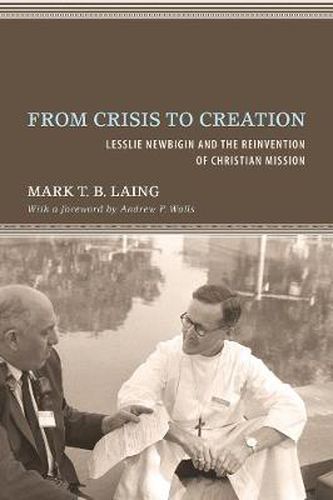Readings Newsletter
Become a Readings Member to make your shopping experience even easier.
Sign in or sign up for free!
You’re not far away from qualifying for FREE standard shipping within Australia
You’ve qualified for FREE standard shipping within Australia
The cart is loading…






This title is printed to order. This book may have been self-published. If so, we cannot guarantee the quality of the content. In the main most books will have gone through the editing process however some may not. We therefore suggest that you be aware of this before ordering this book. If in doubt check either the author or publisher’s details as we are unable to accept any returns unless they are faulty. Please contact us if you have any questions.
Lesslie Newbigin (1909-1998) was one of the seminal theologians of mission in the twentieth century, and perhaps the most important in the English-speaking world. His thinking was anchored in the practice of mission: he was a missionary in India, a bishop of the Indian church, and a leader in emerging international mission structures. In his late years, he pioneered research on how the gospel could engage with Western culture. For many he is the founding father of the missional church movement. This book is the first to address the crucial role Newbigin played in shaping ecumenical thinking on mission during the twentieth century, filling an important gap in our knowledge of the development of twentieth-century missional theology. It does so by seeking to answer a central question in Newbigin’s thinking: How does mission relate to church? Taking the integration of the International Missionary Council with the World Council of Churches as its central focus, this book provides a unique history of crucial events in the ecumenical movement. But more importantly, through a study of Newbigin’s role in the theological debate, this book demonstrates how missional theology evolved during the postwar period when there was a sea change in understandings both of mission and church.
$9.00 standard shipping within Australia
FREE standard shipping within Australia for orders over $100.00
Express & International shipping calculated at checkout
This title is printed to order. This book may have been self-published. If so, we cannot guarantee the quality of the content. In the main most books will have gone through the editing process however some may not. We therefore suggest that you be aware of this before ordering this book. If in doubt check either the author or publisher’s details as we are unable to accept any returns unless they are faulty. Please contact us if you have any questions.
Lesslie Newbigin (1909-1998) was one of the seminal theologians of mission in the twentieth century, and perhaps the most important in the English-speaking world. His thinking was anchored in the practice of mission: he was a missionary in India, a bishop of the Indian church, and a leader in emerging international mission structures. In his late years, he pioneered research on how the gospel could engage with Western culture. For many he is the founding father of the missional church movement. This book is the first to address the crucial role Newbigin played in shaping ecumenical thinking on mission during the twentieth century, filling an important gap in our knowledge of the development of twentieth-century missional theology. It does so by seeking to answer a central question in Newbigin’s thinking: How does mission relate to church? Taking the integration of the International Missionary Council with the World Council of Churches as its central focus, this book provides a unique history of crucial events in the ecumenical movement. But more importantly, through a study of Newbigin’s role in the theological debate, this book demonstrates how missional theology evolved during the postwar period when there was a sea change in understandings both of mission and church.